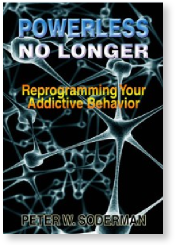Why Set Goals?
Peter Soderman, SMART Recovery® Facilitator, Mexico
 Most people understand that the best way to keep your vehicle headed straight on the highway is to focus your eyes on the furthest point you can see, and let your peripheral vision take care of what’s happening close to you. I was taught that simple trick in High School Driver’s Ed, and had it reinforced in every driving school I have ever attended. The technique has the added benefit of allowing you to see trouble (like brake lights coming on) when it’s still far enough away for you to react in plenty of time. You can easily spot the drivers who aren’t doing this, their cars or trucks are weaving back and forth within, or slightly outside of their lanes, as they fix their gaze right over their hood and try to adjust to a position that is constantly changing.
Most people understand that the best way to keep your vehicle headed straight on the highway is to focus your eyes on the furthest point you can see, and let your peripheral vision take care of what’s happening close to you. I was taught that simple trick in High School Driver’s Ed, and had it reinforced in every driving school I have ever attended. The technique has the added benefit of allowing you to see trouble (like brake lights coming on) when it’s still far enough away for you to react in plenty of time. You can easily spot the drivers who aren’t doing this, their cars or trucks are weaving back and forth within, or slightly outside of their lanes, as they fix their gaze right over their hood and try to adjust to a position that is constantly changing.
What has this technique to do with the importance of setting goals, and changing our belief systems? Quite a lot, actually, and that’s the subject of this post. In the early stages of quitting addictions, our gaze is pretty much fixed right over the hood, in the sense that any goals we set are liable to be extremely short-term, and not very complicated. Our early goals might simply be abstaining for a day, a few days, a week, or a month. In the beginning, it’s difficult for us to focus much farther ahead than this, because we’re still discovering that there is a life without our addiction.
As we progress in our new-found freedom, we find it not only possible to set some longer-term goals, we find that it is necessary in order to sustain a healthy recovery. Our chances of success are much greater if we are moving towards something rather than running away. We also find that keeping our long-term goals in mind helps us make sense of the clutter in our daily lives, and provides part of the criteria for determining if our beliefs are irrational or not.
One of the three criteria for determining rationality of our beliefs is whether or not the belief helps us in achieving our short or long-term goals. If we have a long-term goal fixed in our minds, our “peripheral vision” will eventually, with the proper training, dismiss out-of-hand those beliefs that conflict with the goal. If you set a goal that meets the criteria of the SMART system, it will make your daily decision making much easier, and you are much more likely not to “wiggle back and forth” in your lane.
I’m not going to cover the whole goal-making system here, as it’s covered elsewhere, but let’s say that you have established a long-term goal of obtaining a certain job by a certain time (say 5 years). Let’s also say that the process that is necessary to achieve this goal requires that you complete certain courses at night school by a certain date. Due to a heavy schedule at work, you had insufficient time to study for a particular test, and received a failing grade on it. A typical belief you might have is that the “whole thing is a waste of time, you’ll never pass the course, so why bother trying.” That’s pretty extreme, but if you have your sights firmly set on that goal, and it’s realistic, you will quickly dispose of the negative beliefs that could sabotage your efforts long before you act on them.
Another case might be if you got sick, or something else happened that caused you to miss considerable class time, and it became apparent that you could not meet course requirements for the semester. This is like taillights flashing way ahead of you on the highway. You have to slow down, regroup, repeat the course, and perhaps move your deadline a little. None of this is a really big deal, but if your don’t have the goal firmly in mind, it could cause you to lose sight of where you were headed, and send you off the road.
Stress and situations that drive low self-esteem are the two greatest pitfalls in maintaining a successful recovery. Establishing good long-term goals, along with realistic interim goals, is one of the best ways to maintain high self-esteem and relieve stress that I know of. Like learning to keep your eyes focused on a point as far ahead as you can see on the highway, establishing and maintaining short and long-term goals is a skill that is very important to your continued success.
About the Author: Pete Soderman is a Smart Facilitator, author, and lecturer who co-founded the SMART meeting in Wilmington, NC with Mike Werner, and is currently facilitating a SMART meeting in Ajijic, Jalisco Mexico. He has recently published a book about addiction titled: “Powerless No Longer,” which is available from Amazon.com in both printed and electronic formats, and will soon be available as an audiobook. He has been involved in the addiction and treatment field for many years, and has started several addiction recovery meetings.
